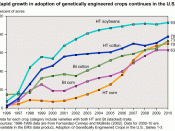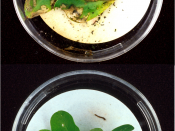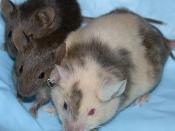In the not-so-distant past, tomatoes were never bred with pigs, nor were strawberries bred with fish, nor apples bred with chickens. However, recent advancements in the field of biotechnology now allow scientists to transcend the laws of Nature. In today's agriculture, dozens of food crops have been genetically altered in order to improve growing characteristics or to enhance their qualities for the market, and these crops are being prepared for commercial production (Bahr 621). Large companies support the work in genetic engineering, looking to profit greatly by it, but the work has not been thoroughly researched and the supporting arguments are not convincing. At first glance, genetic engineering shows great potential for improving foods, in disease prevention, inter alia, but its significant drawbacks eliminate any possible benefits the study could bring.
When genetic engineering is used in commercially produced foods, questions regarding possible health risks are inevitable, and must be seriously considered.
As of right now, the effects of genetically modified foods on our systems are not known; as one pediatric neurologist states, "Manufacturers of genetically altered foods are exposing us to one of the largest uncontrolled experiments in history," (Herbert). She follows with, "Despite claims that these food products are based on 'sound science,' in truth, neither manufacturers nor the government has studied the effects of these genetically altered organisms or their new proteins on people," (Herbert). Currently, approximately 2 percent of adults and 8 percent of children have allergies to commonly eaten foods (Rifkin). The genetic engineering of foods creates the possibility of introducing new allergens; transplanted genes in modified foods can produce proteins which may cause allergic reactions in consumers. Through the use of genetic engineering, even familiar foods could become metabolically dangerous or toxic (Mellon).
Additionally, the consumption of genetically modified foods raises the possibility of...


